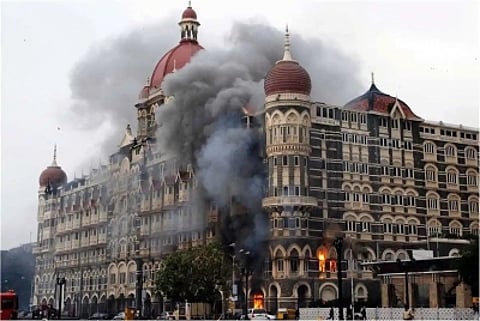By Hamza Ameer
The 2008 Mumbai terror attack that brought arch rivals and neighbours India and Pakistan to the brink, continues to remain as a wall of distrust between the two countries.
Fourteen years on, the Mumbai terror attack case remains on the backburner, at least in the Pakistani courts.
India claims that it has provided several dossiers to Pakistan with what it terms as irrefutable evidence to nab the masterminds behind the attack, including Lashkar-e-Taiba (LeT) and Jamat-ud-Dawa (JUD) chief Hafiz Muhammad Saeed, along with his associates including Zakiur Rehman Lakhwi and others.
India claims Pakistan has deliberately ignored the dossiers and the evidence to clamp down on the Mumbai attack masterminds and has opted to shelter them under the umbrella of the Pakistani courts.
Most recently, India's External Affairs Minister S Jaishankar called the 26/11 Mumbai terror attack case as an "unfinished" task, demanding that the United Nations Security Council (UNSC) ensure justice in the matter.
Speaking at the Special Meeting of the UNSC Counter-Terrorism Committee, held appropriately at Mumbai's Taj Mahal Palace Hotel, Jaishankar said: "It was not just an attack on Mumbai, but an attack on the international community. Nationals of specific countries were identified before being murdered. This task remains unfinished. Therefore, the coming together of the UNSC's Counter Terrorism Committee to this venue is both special and significant."
Pakistan has categorically rejected what it calls India's baseless propaganda against Islamabad and regretted that the Indian MEA chose to "misuse an important Committee of the United Nations Security Council to mislead the international community about Pakistan's role in countering global terrorism".
Referring to the Mumbai terror attack case, Pakistan has reiterated that India has been non-cooperative and has deliberately held back judicial proceedings in the case.
"The Indian government should be held accountable for attempting to unjustifiably prolong the legal proceedings of the Mumbai case by employing a range of dilatory tactics. India must remember that Mumbai attacks case is in the court of law and rather than relying on anyone's whims or wishes, it would require irrefutable and legally tenable evidence for efficient disposal," a press release issued by the Pakistan Foreign Office stated. It was in response to the Indian statement.
It is pertinent to note that every time India brings up the matter of the Mumbai terror attack and puts the onus on Pakistan to act on the evidence provided by New Delhi, Pakistan has consistently brushed aside all claims and has said that the decision on the matter is pending before the court of law. Pakistan also uses the counter-response of reminding New Delhi about the Jammu and Kashmir dispute, the Kulbhushan Jadhav case and the alleged facilitation of Baloch separatists by India to destabilise Pakistan.
While the cross claims and accusations keep pouring in from both sides, the 26/11 Mumbai terror attack case has slowly but surely been pushed onto the backburner.
In Pakistan, there are no further proceedings happening in the case as Islamabad claims that India has not provided any further evidence in the matter, leaving nothing for the courts to see. Therefore, the case has become part of the formality of hearing with no forward movement whatsoever. (SJ/IANS)


